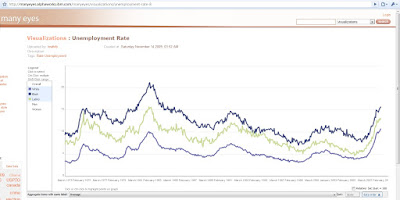With the FED and the TREASURY continuing to purchase billions $$$ of mortgages, with foreclosure and deliquency rates continuing to rise, housing prices continuing to drop and unemployment (both U-3 and U-6) continuing to rise, there really is little reason to hope for anything a reasonable person might call a recovery. Proclamations that the recession is over mean nothing to those caught in the "jobless recovery". The unemployment rate is high enough that the members of Congressional Black Caucus derailed democratic efforts at financial reform, claiming that the bill does too little to stop continued unemployment. Looking at the graphs below, you can understand why.
An interest group has put together data at IBM's "Many Eyes" to show why so many are interested in restarting employment. In the graphs below, the first view is expected - black and hispanic unemployment are always higher in an American recession than white unemployment. What is interesting to me is the second graph, which sets unemployment for all three races at the same "relative set start" in 1973. Notice that at no time in the last thrity years has white unemployment apparently risen so high so fast:
More information on why this unemployment trend may not abate can be found by listening to Robert Reich , Meredith Whitney and Doug Noland.
Robert Reich
"The Great Disconnect Between Stocks and Jobs"
"Obama, China, and Wishful Thinking About American Jobs"
Meredith Whitney gives a great interview on the weakness of American credit and banking fundamentals.
I will let the brilliant Doug Noland have the last words:
"It is my thesis that there is no alternative than a major transformation of the underlying structure of the U.S. economy. In simplest terms, we must produce much more, consume much less and do it with a lot less Credit creation. The objective of current policymaking, however, is to quickly rejuvenate housing and asset prices with the intention of sustaining the legacy economic structure. Zero interest-rate policy is key to this strategy. The objective is to push savers out to the risk asset markets, as well as to transfer returns on savings from the savers to be used instead to recapitalize the banking/financial system. If this reflation is unsuccessful, the household sector will find itself with only greater exposure to risky assets.
No only is the current course of policymaking unjust, I believe it is flawed. The nation’s housing markets will remain rather impervious to low rates, while the household sector is punished with near zero returns on its savings. At the same time, monetary policy will continue to play a major role in dollar devaluation and higher consumer prices for energy and imports. Financial sector profits have already bounced back strongly, but there is little market incentive to direct new finance in a manner that would fund any semblance of economic transformation. The focus remains on financing the old structure. Indeed, I would argue that the current course of policymaking and market interventions only work to delay the unavoidable economic adjustment process."


No comments:
Post a Comment